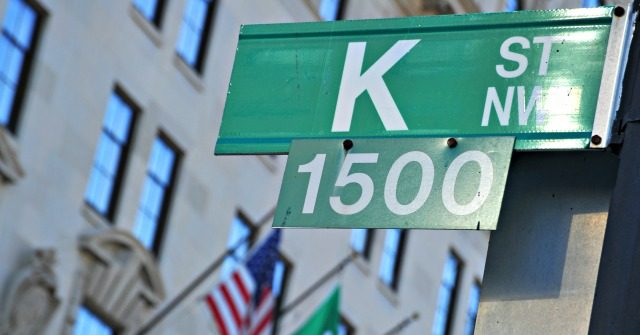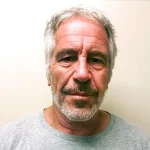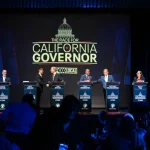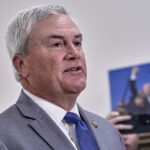
Mullins discussed his book, which is set to be released on May 7, and explained that the "Wolves of K Street" refers to the "corporate lobbyists" in America who really run the show behind the scenes.
The post Exclusive – Brody Mullins: ‘Another Branch of Government’ Has ‘More Power than the Presidency’ appeared first on Breitbart.

While voters in America argue about which political party is the “problem” in Washington, D.C., there is another branch of government that nobody talks about, which “sometimes holds more power than the presidency,” Brody Mullins, a veteran investigative reporter for the Wall Street Journal and the co-author of the upcoming book, The Wolves of K Street, said during an appearance on Breitbart News Saturday.
Mullins discussed his book, which is set to be released on May 7, and explained that the “Wolves of K Street” refers to the “corporate lobbyists” in America who really run the show behind the scenes.
“People talk about how, you know, the Democrats are the problem, or the Republicans are the problem in Washington. And, you know, presidencies come and go and the swamp still remains the same,” Mullins explained. “So, we wanted to dig deeper and say, ‘What’s really at the core of the problems in Washington?’ and we look at the lobbying community.”
“Corporate lobbyists spend so much money on Washington, they have both parties in their pockets and they really get passed, whatever they want for the last 40 or 50 years. And, that’s really what we tried to expose,” Mullins continued. “How much money corporations are spending to change public policy in ways that help companies, but hurts the rest of us.”
Mullins explained that college students majoring in “political science” end up learning “how Washington works,” and that there are “three branches of government, and there’s checks and balances.”
“These branches of government are constantly in tension trying to create and pass laws that are constitutional,” Mullins explained. “What no one talks about is that there is another branch of government, and that is the corporate America and corporate lobbyists, and they have sometimes more power than the presidency. We have a bunch of examples in the story of presidents of the United States trying to pass legislation that they thought was good for the country, Republicans and Democrats, and being blocked by corporate America because corporations have so much influence in Washington to block things.”
One example of how lobbyists tend of have so much influence in Washington is House Speaker Mike Johnson’s (R-LA) top policy adviser, Dan Ziegler. Prior to joining Johnson’s office as his top policy adviser, Ziegler had been a lobbyist with the firm Williams & Jensen.
While serving as a lobbyist, Ziegler accumulated a client list, which includes several companies that are interested in Congress sending aid to Ukraine. Prior to Johnson pushing forward a $95 billion foreign package, which sent $61 billion in aid to Ukraine, he had been an opponent of sending more aid to Ukraine.
Mullins continued to explain that the job of a lobbyist is to serve as a “translator, “guide,” and a “sherpa for a company.”
“Let’s say you’ve got some company in Minnesota and there’s some clean air regulation that’s hurting their business, and they say, ‘Hey, you know, how do I get around this regulation?’ or, ‘How do I push back this regulation?’ or, ‘How do I comply with this regulation?’ And, the federal bureaucracy is so complicated. The rules themselves, they are written by lawyers. They are incredibly difficult to understand, so you need someone in Washington who can help you understand what the regulation is.”
“And, then, who is the right person to even talk to about this regulation? That’s where a lobbyist comes in. A lobbyist will, for a company say, ‘Okay, you need to talk to someone, not at the Environmental Protection Agency, but which division or subdivision at the EPA you need to talk to,’ and which of these five hundred thirty-five members of Congress cares about this regulation or legislation, and which committees or subcommittees are they on.”
“The other part of the lobbyist’s job is to have the relationship with the member of Congress, and the way you do that, unfortunately, is through money,” Mullins explained. “Lobbyists spend a lot of money on campaign donations and you know, taking members of Congress to dinner, or to lunch, or sometimes playing golf at fundraising trips, or going skiing on fundraising trips in order to create that relationship, so when the lobbyist calls and says, ‘Hey member of Congress Johnson, I’ve got this client of mine from Minnesota who’s got a problem with the clean air regulation. Can I have him come to your office and explain his problem to you, and maybe you can help him?’”
“So, I think that’s basically what a lobbyist does. Making the connection to the important people on Capitol Hill, and then getting the clients and sort of introducing them for a conversation. There’s nothing wrong with any of that. It’s all protected by the First Amendment,” Mullins said. “The problem is that companies these days have all the money to hire a lobbyist to try to change the legislation. The rest of us, the little guy, we don’t have lobbyists. So, very few people are looking out for our interests and that’s really the problem. Companies have their thumb on the scale, they’re pushing for legislation that helps them and no one’s pushing for us.”






